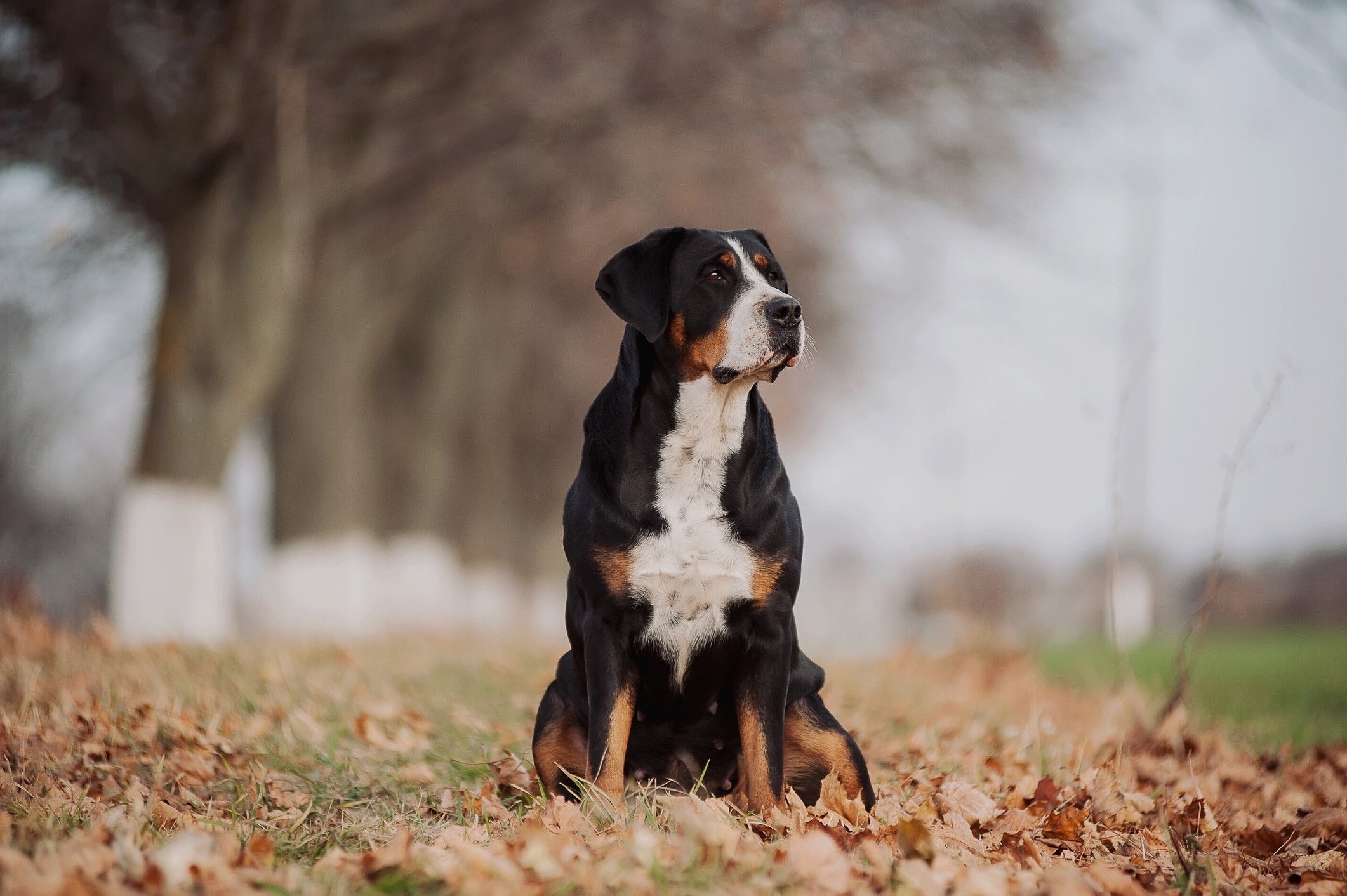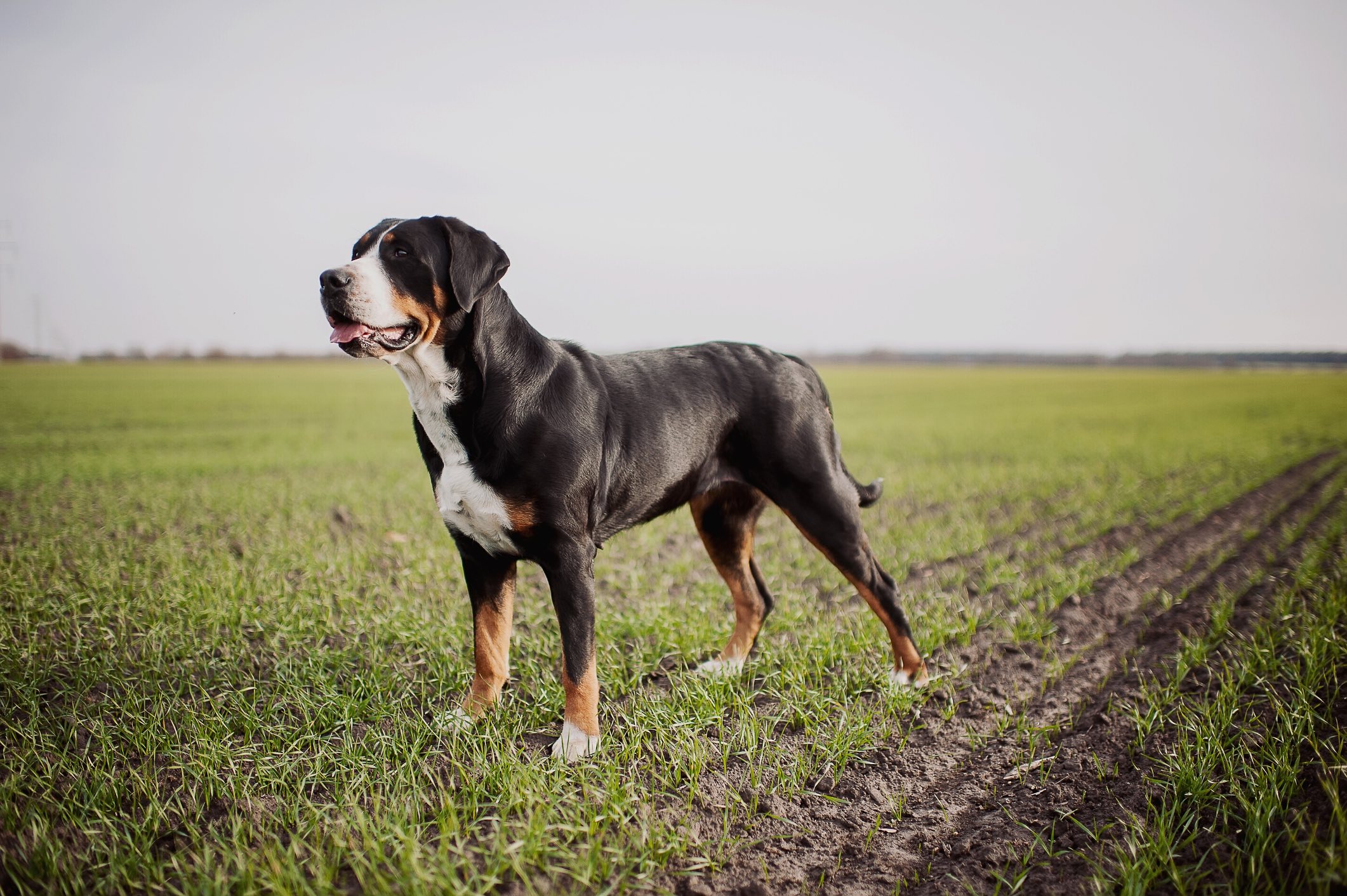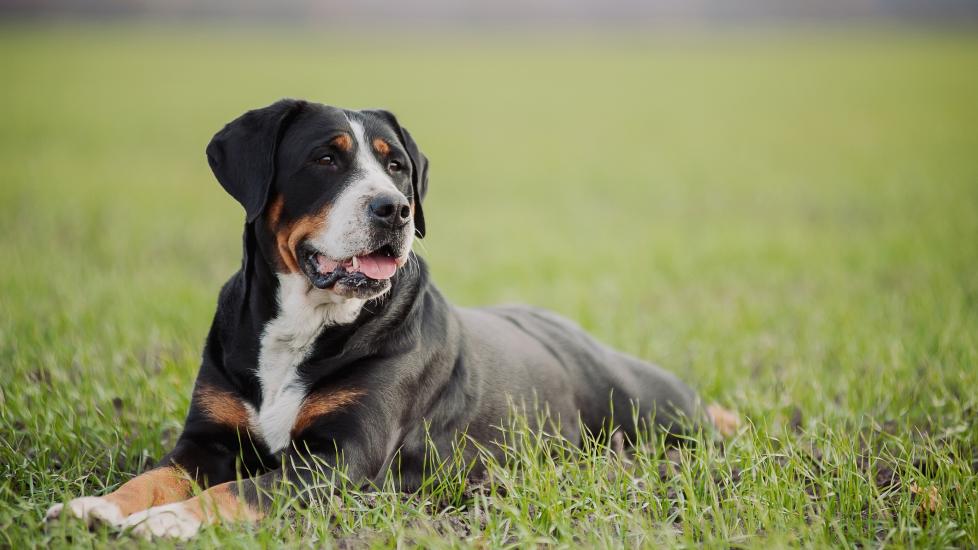Greater Swiss Mountain Dog
Greater Swiss Mountain Dogs became popular among European farmers and herders in the 19th century for their renowned strength. These once-popular large dogs have become rare in the decades since, but they can make wonderful dogs for active families and are “known to be very gentle with children,” according to the Greater Swiss Mountain Dog Club of America (GSMDCA).
Males generally stand 25.5–28.5 inches tall and weigh 115–140 pounds. Female Greater Swiss Mountain Dogs are slightly smaller, at about 24 –27 inches tall and weighing up to 110 pounds.
Caring for a Greater Swiss Mountain Dog
A “Swissy,” as the breed is sometimes called, can make an exceptional partner in work or play. According to the GSMDCA, Greater Swiss Mountain Dogs are strong workers capable of pulling carts with loads up to 3,000 pounds—an impressive strength that made the breed popular with Swiss farmers. Swissies need to stay active and mentally stimulated thanks to their hardworking history.
Along with their strength, Greater Swiss Mountain Dogs are known for their resounding bark, friendly temperament, and a “wash-and-wear coat” that requires minimal maintenance outside of brushing and washing.
Greater Swiss Mountain Dog Health Issues
Greater Swiss Mountain Dogs have an average lifespan of 8–11 years. Like all dogs, they are predisposed to certain health conditions pet parents should be aware of. Pet insurance may be a good investment when bringing home a Greater Swiss Mountain Dog puppy to help offset costs from any health issues that arise.
Epilepsy
Greater Swiss Mountain Dogs can be prone to epilepsy, a seizure disorder that usually presents sometime between 1–3 years of age. Signs of a seizure include stiffening, unusual limb movements, and convulsing. If you notice any of these signs in your Swissy, take them to the vet immediately.
Epilepsy treatment typically includes a daily medication to prevent seizures. Rescue medications may also be used to end a seizure that lasts longer than a few minutes.
Eyelash Issues
Swissies can develop distichiasis, a condition characterized by extra eyelashes that rub the eye’s surface. They can also develop entropion, a condition in which the eyelid grows inward. Both can cause irritation and pain. If you notice redness or discharge, or if your dog is pawing at their eyes, call your vet. Both disorders can be corrected with surgery.
Urinary Incontinence
Urinary incontinence, or difficulty holding their bladder, can affect Greater Swiss Mountain Dogs. The ailment is more likely to occur in middle-aged and senior female Swisses, according to the GSMDCA. The most common cause is the urethral sphincter not contracting properly to hold urine. Contact your vet if your dog urinates during sleep or when they walk, or if they frequently lick their genitals.
Gastric Dilatation-Volvulus (GDV)
Gastric dilatation-volvulus is a serious form of bloat in dogs in which the stomach fills with gas and twists, cutting off blood to important abdominal organs.
Signs of GDV include:
-
Inability to settle
-
Decreased appetite
-
Retching and gagging without vomiting
-
Drooling
This condition is more common in large breeds with deep chests, including Greater Swiss Mountain Dogs. If any symptoms of bloat are noticed, take your dog to your primary care vet or an emergency veterinary hospital immediately. GDV is a life-threatening emergency, and your dog must receive veterinary care as soon as possible.
Joint Dysplasia
Hip dysplasia and elbow dysplasia are characterized by joint instability that develops secondary to abnormal growth. Greater Swiss Mountain Dogs can develop both conditions, which can lead to arthritis.
In mild cases, hip and elbow dysplasia can be managed with weight loss and pain medications. Severe cases may require surgery.
What To Feed a Greater Swiss Mountain Dog

Greater Swiss Mountain Dogs should be fed a dry or wet food that meets nutritional requirements set by the Association of American Feed Control Officials (AAFCO). When choosing the best food for your dog, consider their health, age, and lifestyle. Talk to your veterinarian for recommendations.
How To Feed a Greater Swiss Mountain Dog
Greater Swiss Mountain Dog puppies need to eat three to four times a day to support their rapid growth, and they should be fed a puppy food designed for large breeds.
Adult Swissies should be fed at least twice a day. Smaller feedings help reduce the likelihood of bloat and GDV, so never feed your Greater Swiss Mountain Dog one big daily meal. To further reduce the risk of this medical emergency, avoid using elevated food bowls and do not exercise your dog directly before or after mealtimes.
How Much Should You Feed a Greater Swiss Mountain Dog?
The amount of food to give your dog varies by individual. AAFCO-approved dog foods include a feeding guide that recommends daily portions based on your dog’s weight. But for more accurate guidance, talk to your vet, who can tailor their feeding recommendations to your dog’s age, lifestyle, and health.
Nutritional Tips for Greater Swiss Mountain Dogs
Only give supplements if your veterinarian recommends them, because pups should already be receiving all necessary nutrients from an AAFCO-compliant diet. That said, Greater Swiss Mountain Dogs may benefit from joint supplements containing glucosamine to help with joint issues. Supplements containing omega-3 fatty acids, such as fish oil, can also be used to improve your dog’s coat health.
Behavior and Training Tips for Greater Swiss Mountain Dogs
Greater Swiss Mountain Dog Personality and Temperament
The Greater Swiss Mountain Dog temperament is “happy” and “jovial,” with an “enthusiastic nature and strong affinity to people and children,” according to the breed club. This makes them great family dogs who are gentle with children. However, all interactions between kids and dogs should be supervised, regardless of the dog’s breed.
Greater Swiss Mountain Dog Behavior
Swissies have bursts of activity, but they are not hyper and keep a robust napping schedule when well-exercised. More than anything, this breed wants to be with their family and involved in their activities, whether that includes hiking or lounging on the couch.
Greater Swiss Mountain Dogs are known for their resounding bark, friendly temperament, and a “wash-and-wear coat” that requires minimal maintenance outside of brushing and washing.
Always alert, Greater Swiss Mountain Dogs will bark if they think something is amiss. But, in general, this friendly breed is accepting of new people if they’ve been well-socialized as puppies. Due to their history, these dogs can have a strong herding instinct, so Greater Swiss Mountain Dog puppies need to be taught early that they should not chase smaller animals, such as cats.
Greater Swiss Mountain Dog Training
Greater Swiss Mountain Dogs should be consistently trained with positive reinforcement methods throughout their lives. Early and consistent socialization is equally important for them to grow into well-mannered companions. Training a Swissy will take some patience, as the breed was historically bred to work independently and can have a strong will.
Since Swissies were once bred to pull heavy carts, take the time to properly leash train your dog, so they learn to not pull on walks.
Fun Activities for Greater Swiss Mountain Dogs
-
Drafting (pulling a wagon or cart)
-
Hiking
-
Rucking
-
Obedience
Greater Swiss Mountain Dog Grooming Guide
Swiss Mountain Dogs have a tricolor coat that makes them look like a short-haired Bernese Mountain Dog. But unlike Berners, grooming a Swissy is relatively low-maintenance.
Skin Care
Most Greater Swiss Mountain Dogs do not require a robust or unique skin care plan outside of regular bathing. Talk to your vet if you notice any changes in your Swissy’s skin.
Coat Care
Greater Swiss Mountain Dogs shed quite a bit but are otherwise easy to maintain. Regular brushing and bathing will help minimize shedding, especially in the spring and fall when shedding increases.
Eye Care
Because Swissies can develop a few eye conditions, pet parents must monitor their eyes for redness, cloudiness, or discharge. Talk to your vet if you notice anything concerning.
Ear Care
Greater Swiss Mountain Dogs require weekly ear cleanings to prevent infections from developing. Use a veterinary-approved ear cleaner.
Considerations for Pet Parents

Before bringing home a Greater Swiss Mountain Dog, ask yourself a few questions:
-
Do I have the time, patience, and dedication to train a large working dog?
-
Do I have space in my home for a 100-plus-pound dog?
-
Can I afford the food and medical care a large dog needs?
-
Am I prepared to confront any health conditions a Swissy can face?
-
Am I OK with lots of shedding?
-
Do I have the time to exercise a dog every day?
If you answered “yes” to these questions, a Swissy might be the dog for you.
Greater Swiss Mountain Dog FAQs
What’s the difference between a Greater Swiss Mountain Dog and a Bernese Mountain Dog?
Greater Swiss Mountain Dogs and Bernese Mountain Dogs share a common ancestor, along with two other breeds: the Appenzeller and the Entlebucher Mountain Dog. Though they share a similar build and coat, there are differences between Swissies and Berners. Greater Swiss Mountain Dogs are typically larger than Bernese Mountain Dogs. Swissies also have a short coat, while the Berner has longer fur.
Are Greater Swiss Mountain Dogs rare?
Greater Swiss Mountain Dogs are considered a rare breed, according to the breed club.
How expensive are Greater Swiss Mountain Dogs?
Purchasing a Greater Swiss Mountain Dog puppy from a reputable breeder can cost anywhere from $1,500 to $3,000.
Featured Image: Nadiia_Diachenko/iStock / Getty Images Plus via Getty Images
